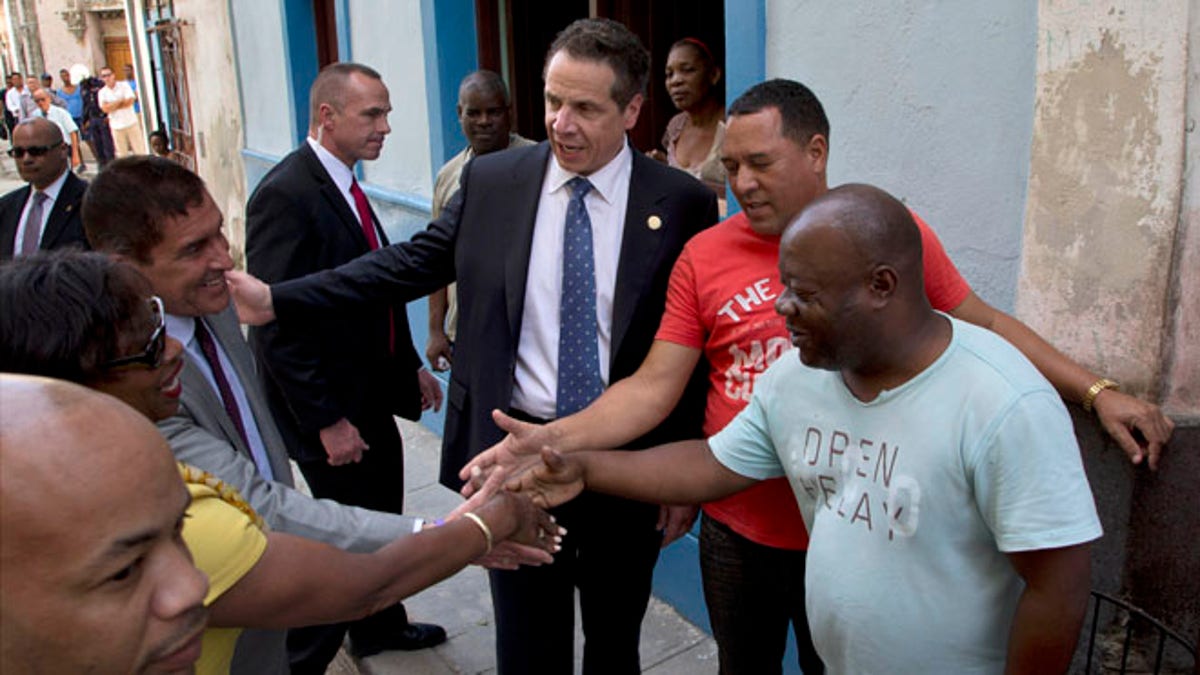
New York Governor Andrew Cuomo, center, greets people on a street in old Havana, Cuba, Monday, April 20, 2015. The formal state visit, a trip that makes Cuomo the first American governor to visit the island since the recent thaw in relations with the communist nation, is meant to foster greater ties between New York and Cuba. (AP Photo/Ramon Espinosa)
HAVANA (AP) – Tourists in shorts and sandals aren't the only foreigners flooding Havana these days.
Top diplomats from Japan, the European Union, Italy, the Netherlands and Russia have visited the island in recent months in bids to stake out or maintain ties with an island that suddenly looks like a brighter economic prospect amid warming U.S.-Cuba relations.
On Sunday night, Francois Hollande becomes the first French president to ever visit communist Cuba, bringing along five ministers and two dozen business people, including the heads of Pernod-Ricard, Cuba's partner in exporting Havana Club rum, and grain exporter Soufflet.
"It's impossible to deny that diplomatic detente between Washington and Havana has accelerated the process of normalization between Cuba and Europe," said Salim Lamrani, a Cuba expert at France's University of La Reunion.
Cuba was once accustomed primarily to visits from leftist Latin American partners and smaller allies in Africa and the Caribbean.
- Cuba is training purebred horses for luxury market
- Travelers flock to Cuba before American invasion
- Cuban capital to reopen amid thaw in Washington-Havana relations
- Decayed Catholic churches in Cuba to be restored as part of quiet reconciliation between Church and state
- 55 years of near-misses, might-have-beens: U.S.-Cuban relations since 1959
- Not so hip: USAID tried to infiltrate Cuba through its rap scene
- Cuban dancers shine in return to Havana
Now, virtually all of the visiting diplomatic delegations are accompanied by high-powered business people interested in Cuba's push to draw more than $8 billion in new foreign investment as part of a broader, gradual economic liberalization. The delegations are also working to ensure that Cuba doesn't forget its old friends in what eventually could be a new era of increased business with the United States.
"We've never stopped believing in and betting on Cuba," said Jean-Francois Lepy, the commercial director of Soufflet, which has been in Cuba for 30 years. Sixty French firms have active operations on the island.
Spain, the Netherlands, Italy and France are Cuba's biggest trading partners within the European Union, which is the island's second-largest economic partner with a combined $4.65 billion a year in trade in food, machinery and other goods. Top partner Venezuela accounts for $7 billion, mostly highly subsidized oil.
Like virtually all European business people who have established a foothold in Cuba despite its labyrinthine bureaucracy and unpredictable business environment, Lepy said the U.S.-Cuba warming represents "a risk and a challenge" for his business.
That will be even more so if agricultural interests and other U.S. businesses successfully push Congress to lift the half-century trade embargo on the Caribbean country.
"If the embargo is lifted, the U.S. market, so much closer to Cuba, will be an important competitor for us and our exports to Cuba might go down," Lepy said.
As a backup plan, his firm is also looking at ways to export processing technology and know-how to Cuba instead of just grain, he said.
Many foreign business people see the U.S. less as a competitor than as a potential source of jet-fueled future growth for the businesses they have established, or hope to establish, in Cuba.
Foreign Minister Fumio Kishida became the highest-level Japanese official to visit Cuba this month when he brought several dozen representatives of his country's automotive, finance, health and tourism industries on a trip aimed at increasing business.
A British business delegation led last month by Lord Hutton of Furness, head of Britain's non-governmental Cuba Initiative, announced $400 million in new agriculture, energy, tourism and other projects. Cuban state media reported Friday that the Ministry of Tourism had just signed a deal with China to build a golf course east of Havana.
A French presidential spokesman told reporters this week that while his government expected no immediate economic benefits from the highest-level European visit since the Dec. 17 announcement of detente, "it's important to be the first."
"It would be absurd to throw oneself into a race with the United States; the ties that we have aren't the same, they're not even the same scale," the French spokesman said on customary condition of anonymity.




